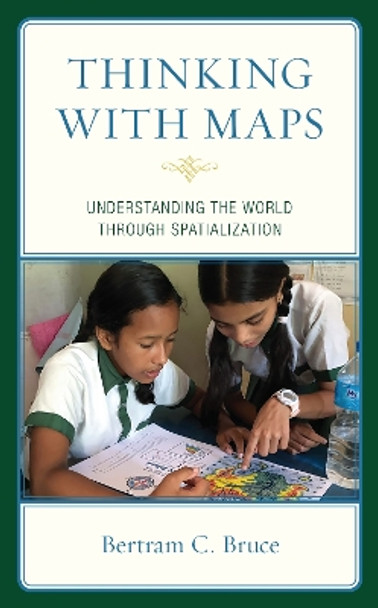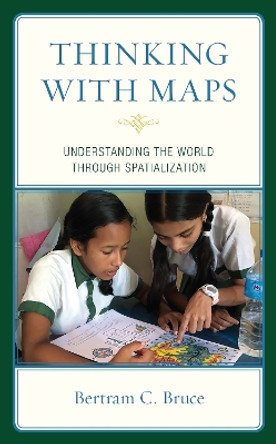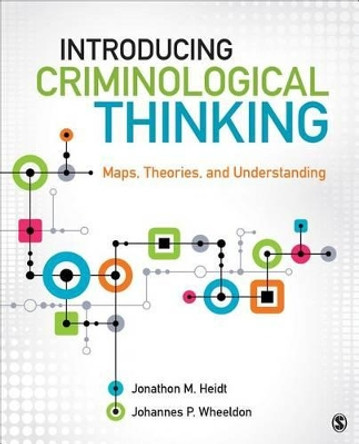Description
Spatial reasoning, which promises connection across wide areas, is itself ironically often not connected to other areas of knowledge. Thinking with Maps: Understanding the World through Spatialization addresses this problem, developing its argument through historical analysis and cross-disciplinary examples involving maps. The idea of maps here includes traditional cartographic representations of physical environments, but more broadly encompasses the wide variety of ways that visualizations are used across all disciplines to enable understanding, to generate new knowledge, and to effect change.
The idea of thinking with maps is also used broadly. Maps become, not simply one among many items to learn about, but indispensable tools for thinking across every field of inquiry, in a way similar to that of textual and mathematical language. Effective use of maps becomes a way to make knowledge, much as writing or mathematical exploration not only displays ideas, but also creates them. The book shows that maps for thinking are not just a means to improve geographic knowledge, as valuable as that may be. Instead, they provide mechanisms for rejuvenating our engagement with the world, helping us to become more capable of facing our global challenges.
This book has a broader aim: It is fundamentally about general principles of how we learn and know. It calls for a renewed focus on democratic education in which both the means and ends are democratic. Education, just as the political realm, should follow Dewey's dictum that "democratic ends need democratic methods for their realization." Maps and mapping are invaluable in that endeavor.
About the Author
Bertram C. Bruce has a PhD in computer science and is professor emeritus in information science at the University of Illinois. He has worked on education in many countries, across grade levels, and in diverse areas of the curriculum. His work contributes to a tradition of democratic education, asking "How can we guide the educational enterprise by an ethical vision, not simply a technocratic one of transmitting isolated facts and skills?" His most recent book is Education's Ecosystems: Learning through Life.
Reviews
Bruce's fascinating and insightful book draws the reader into a wide-ranging exploration of the nature of maps, and their vital roles in the process of education and global understanding.
-- Michael H. Fisher, Danforth Professor of History, Oberlin College, USThe author connects "maps and map-making" to virtually every discipline and human endeavor by leveraging his unusual multidisciplinary experience.
-- Nama Budhathoki, Executive Chairman, Kathmandu Living Labs, NepalThis book is a welcome addition to the field of education at all levels and disciplines. By emphasizing maps as visual language, equally important as languages of words and math symbols, it address a serious deficit in the way maps are currently taught, largely as an afterthought, relegated to "map questions" or simple identification of place names and locations. This book, by contrast, identifies maps and other graphics as essential elements in helping us make connections across time, space, and subject material.
-- Gary Benenson, Project Director of City Technology, City College of New YorkWhat emerges from Bruce's description of thinking with maps is the hugely important and often overlooked role of context-the rich network of influences and interactions that follow from broad-sense "location". Language and mathematics both struggle to deal effectively with context-language primarily because of its inherent linearity, and mathematics because interactions and combinatorics overwhelm its methodology.
This book's novelty comes from providing the concept of visualized contextual thinking with both a strong philosophical foundation and important real-world applications. Profoundly important, in my view. We all do much of our thinking with maps. This book shows just how broadly this idea applies and how profound are its implications: for teaching, for learning, for improving society. An insightful and inspiring perspective.
-- Philip H. Crowley, Professor of Biology, University of KentuckyBruce's point that maps are tools for thinking, in the way of language or mathematics, is significant at this time of accelerating global interconnectedness. Moreover, the global existential threats of the Corona virus pandemic and climate change make this reconsideration of maps from an interdisciplinary perspective timely. Anyone watching the evening news sees countless examples of the diverse ways that information about the progress of the pandemic is communicated in words, carefully plotted in graphs, expressed in numbers, and mapped in geographic regions. Bruce calls our attention to the perennial interest of the education community in maps and how they may be used to promote interdisciplinary education.
Bruce's breadth of experience working with students from marginalized groups in a variety of settings, including US, Alaska (a distinct enough part of the US to merit separate notice), and Nepal, lends authority to his theoretical constructs. The breadth of his academic background and interests is refreshing in an age of specialists. Moreover, this broad background lends authority to his interest in promoting interdisciplinary studies.
The scope of this book makes real Bruce's claim that maps serve far greater purposes than the simple absorption of geographical information. His intellectual disposition toward inquiry and his affinity to inquiry-based learning is embodied in his presentation of maps as tools of inquiry into diverse subject matter. Although this book should be of special interest to educators, I agree with his statement: "This book can be a resource for intelligent use of maps in any endeavor."
Bruce explodes our traditional conception of maps as he considers maps as tools of inquiry in diverse fields. He continually reaches beyond maps to consideration of what maps afford us, even a view of ourselves.
-- Sam Brian, City University of New YorkI recommend this book very highly-it's a read that makes one feel in the company of an intelligent mind, who is taking one's hand, and leading one down a path of fascinating, interconnected thoughts on the importance and meaning of maps, which are used to gain a better appreciation of a region's physical and social history. Read this is as if one has become an explorer, invited down a timeline and across the earth, to learn from the revelations along the journey. From the old fold-up maps we all struggled with during car trips to the technological advances of current cartography, maps reveal culture, values, politics, claim territory or indeed even assert the existence of a people, such as the recent locating of thousands of indigenous communities in Peru. This is a valuable journey, spent with a well-informed traveler!
-- Mary Grizzard, Professor of National Security Affairs (retired), National Defense University, Washington, DCThis book is a fascinating collection of ideas about maps, their many forms, and the way people use them to both influence and be influenced by their environment. Maps and map reading are presented as personal experiences. Every map has a maker and every map has a user.
-- Abby Kerlin and Ellen McCrum, Bank Street College of EducationThis is a fascinating book! If you would like to know what Paris street names have in common with the study of poverty in Nineteenth Century London, if you are curious about how fossilized footprints discovered in England shed light on the daily life of humans who lived 850,000 years ago, or wonder how maps can be used in the classroom to promote democratic education, this is the book for you.
-- Paul Horwitz, Concord ConsortiumAwards
Winner of Outstanding Academic Title 2022.
Book Information
ISBN 9781475859294
Author Bertram C. Bruce
Format Paperback
Page Count 208
Imprint Rowman & Littlefield
Publisher Rowman & Littlefield
Weight(grams) 318g
Dimensions(mm) 231mm * 152mm * 16mm





